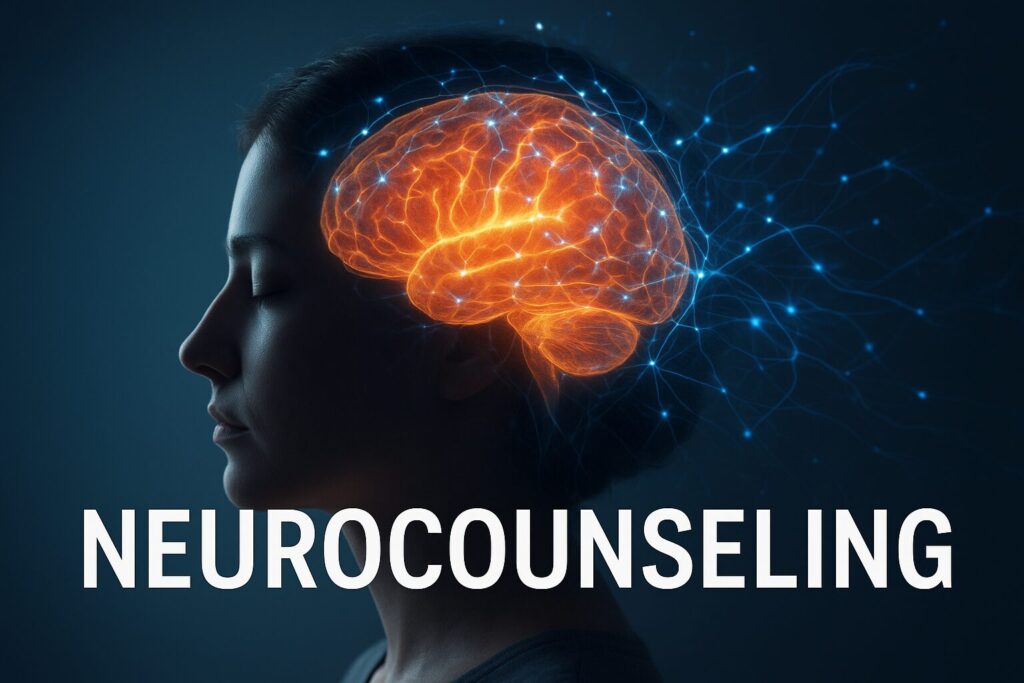
Mental health care is changing fast. One of the most exciting new approaches is neurocounseling, a way of blending talk therapy with modern brain science (Lorelle&Michele, 2017).
Instead of only focusing on thoughts and feelings, neurocounseling looks at how the brain itself changes during therapy and uses that knowledge to make treatment more effective.
This approach is grounded in neuroscience research showing that the brain can rewire itself, a concept known as neuroplasticity (Gazerani, 2025). When therapy helps people learn healthier ways of thinking and responding, those changes can actually be seen in brain scans. Neurogenesis (Vaz et. al, 2022) another concept states that certain areas of the brain, such as the hippocampus, can grow new neurons throughout life. This is influenced by factors like learning, exercise, and stress reduction, all often built into neurocounseling programs. Furthermore, new research on neurobiological influences (Lomas, 2024) highlight that imbalances in brain circuits, like an overactive amygdala after trauma, reduced prefrontal cortex activity in depression, or stress-related hippocampal changes, can guide targeted strategies in neurocounseling.
Why It Matters for Healing
Neurocounseling is especially useful for:
- Trauma recovery: Research shows trauma changes brain regions like the amygdala and prefrontal cortex, but targeted therapy can reverse some of these effects (Oberle et al., 2021).
- Anxiety and depression: Studies have found that combining cognitive-behavioral therapy with neuroscience-based strategies can improve emotional regulation and reduce symptoms (Young & Craske, 2018).
- Attention and focus problems: Tools like neuron-tasks-stimulations—training the brain to change its own activity—are being used to support ADHD and stress regulation (Da Silva et. al, 2018).
Neurocounseling at Daisy Clinic
At Daisy Clinic, Dr. Maxim combines her expertise in neuroscience, clinical psychology, and psychotherapy to create a personalized neurocounseling plan for each client. By blending traditional therapy with brain-based tools, she helps clients strengthen emotional resilience, improve focus, and build lasting change. This modern approach is not just about feeling better, it’s about creating healthier brain patterns for a stronger, more balanced life.
Example: Burnout – The 21st Century Affliction
Imagine feeling like your brain is “stuck in overdrive.” You wake up tired, struggle to focus, and even small tasks feel overwhelming. This is what burnout can feel like—your stress system (the amygdala and adrenal response) is always on, while your motivation and emotional balance (linked to the prefrontal cortex and dopamine pathways) start to shut down.
Neurocounseling can help by teaching the brain to switch off its constant stress alarm, reactivating focus and emotional regulation. Techniques like guided breathing with cognitive-task stimulation or mindfulness can lower stress hormone activity, while other cognitive exercises strengthen brain networks for decision-making and resilience. Over time, this doesn’t just make you feel calmer, it actually helps your brain recover from the wear-and-tear of chronic stress.
Whether you are struggling with anxiety, trauma, burnout, or simply want to enhance your mental performance, neurocounseling offers a modern, science-backed way forward.
Take the first step toward a healthier brain and a more balanced life. Contact the experts at Daisy Clinic today to explore how neurocounseling can work for you.